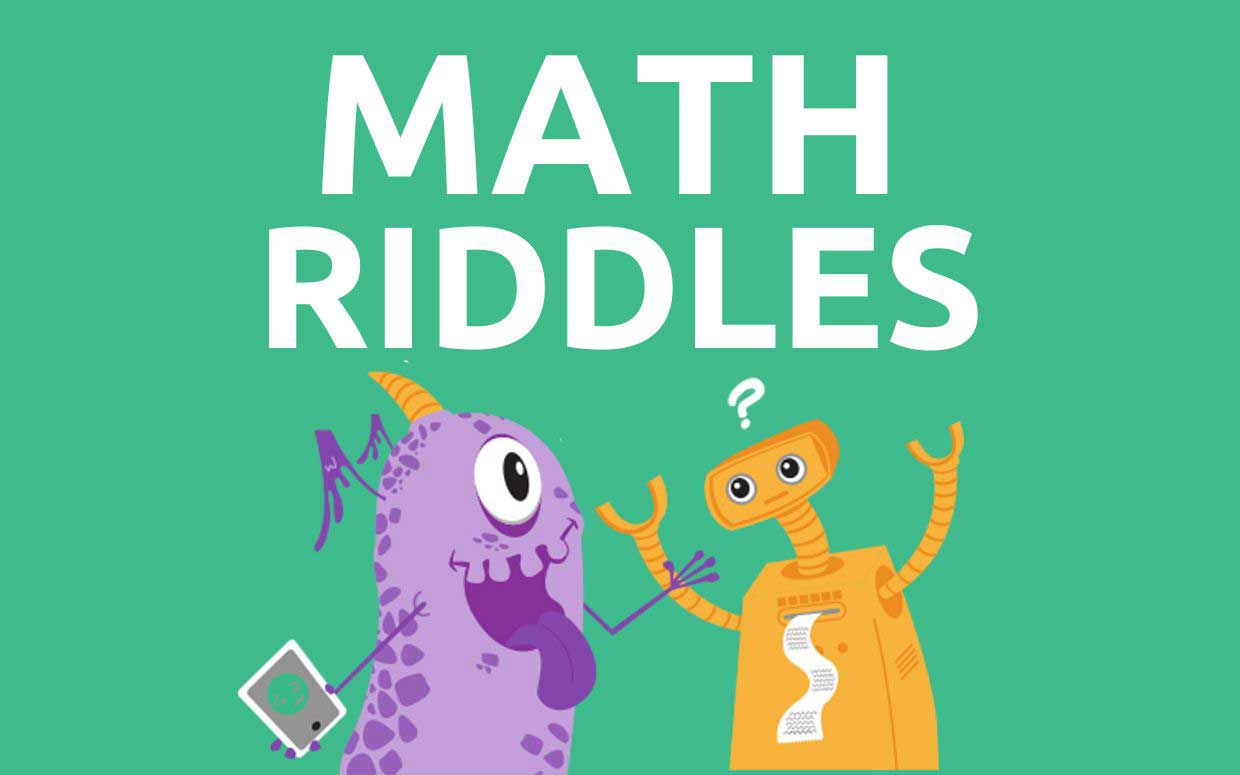
Riddle:
0,1,2,3,4,5,6,7,8,9
How can you use the digits above once each only to compose two fractions which when added together equal 1?
Answer: 35/70 + 148/296 = 1
Riddle:
A mother has three sick children. She has a 24-ounce bottle of medicine and needs to give each child eight ounces of the medicine. She is unable to get to the store and has only three clean containers, which measure 5, 11 and 13 ounces. The electricity is out and she has no way of heating water to wash the containers and doesn't want to spread germs. How can she divide the medicine to give each child an equal portion without having any two children drink from the same container?
Answer: Fill the 5 oz. and 11 oz. Containers from the 24 oz. container. This leaves 8 oz. in the 24 oz. bottle. Next empty the 11 oz. bottle by pouring the contents into the 13 oz. bottle. Fill the 13 oz. bottle from the 5 oz. container (with 2 oz.) and put the remaining 3 oz. in the 11 oz. bottle. This leaves the 5 oz. container empty. Now pour 5 oz. from the 13 oz. bottle into the 5 oz. bottle leaving 8 oz. in the 13 oz. bottle. Finally pour the 5 oz. bottle contents into the 11 oz. bottle giving 8 oz. in this container.
Riddle:
You go to the doctor because you're ill and he prescribes you with 3 pills and tells you to take them every half hour.
How long do the pills last you?
Answer: An hour because the first pill doesn't take 30 min. to take.
Riddle:
There are 100 light bulbs lined up in a row in a long room. Each bulb has its own switch and is currently switched off. The room has an entry door and an exit door. There are 100 people lined up outside the entry door. Each bulb is numbered consecutively from 1 to 100. So is each person. Person No. 1 enters the room, switches on every bulb, and exits. Person No. 2 enters and flips the switch on every second bulb (turning off bulbs 2, 4, 6, ...). Person No. 3 enters and flips the switch on every third bulb (changing the state on bulbs 3, 6, 9, ...). This continues until all 100 people have passed through the room. What is the final state of bulb No. 64? And how many of the light bulbs are illuminated after the 100th person has passed through the room?
Answer: First think who will operate each bulb, obviously person #2 will do all the even numbers, and say person #10 will operate all the bulbs that end in a zero. So who would operate for example bulb 48: Persons numbered: 1 & 48, 2 & 24, 3 & 16, 4 & 12, 6 & 8 ........ That is all the factors (numbers by which 48 is divisible) will be in pairs. This means that for every person who switches a bulb on there will be someone to switch it off. This willl result in the bulb being back at it's original state. So why aren't all the bulbs off? Think of bulb 36:- The factors are: 1 & 36, 2 & 13, 6 & 6 Well in this case whilst all the factors are in pairs the number 6 is paired with it's self. Clearly the sixth person will only flick the bulb once and so the pairs don't cancel. This is true of all the square numbers. There are 10 square numbers between 1 and 100 (1, 4, 9, 16, 25, 36, 49, 64, 81 & 100) hence 10 bulbs remain on.
Riddle:
You are given a set of scales and 12 marbles. The scales are of the old balance variety. That is, a small dish hangs from each end of a rod that is balanced in the middle. The device enables you to conclude either that the contents of the dishes weigh the same or that the dish that falls lower has heavier contents than the other. The 12 marbles appear to be identical. In fact, 11 of them are identical, and one is of different weight. Your task is to identify the unusual marble and discard it. You are allowed to use the scales three times if you wish, but no more. Note that the unusual marble may be heavier or lighter than the others. How can you identify it and determine whether it is heavy or light?
Answer: Number the marbles from 1 to 12. For the first weighing put marbles 1,2,3 and 4 on one side and marbles 5,6,7 and 8 on the other. The marbles will either they balance or not. If they balance, then the different marble is in group 9,10,11,12. Thus, we would put 1 and 2 on one side and 9 and 10 on the other. If these balance then the different marble is either 11 or 12. Weigh marble 1 against 11. If they balance, the different marble is number 12. If they do not balance, then 11 is the different marble. If 1 and 2 vs 9 and 10 do not balance, then the different marble is either 9 or 10. Again, weigh 1 against 9. If they balance, the different marble is number 10, otherwise, it is number 9. That was the easy part. What if the first weighing 1,2,3,4 vs 5,6,7,8 does not balance? Then any one of these marbles could be a different marble. Now, in order to proceed, keep track of which side is heavy for each of the following weighings. Suppose that 5,6,7 and 8 is the heavy side. We now weigh 1,5 and 6 against 2,7 and 8. If they balance, then the different marble is either 3 or 4. Weigh 4 against 9, a known good marble. If they balance then the different marble is 3 or 4. Then, if 1,5 and 6 vs 2,7 and 8 do not balance, and 2,7,8 is the heavy side, then either 7 or 8 is a different, heavy marble, or 1 is a different, light marble. For the third weighing, weigh 7 against 8. Whichever side is heavy is the different marble. If they balance, then 1 is the different marble. Should the weighing of 1,5 and 6 vs 2,7 and 8 show 1,5,6 to be the heavy side, then either 5 or 6 is a different heavy marble or 2 is a light different marble. Weigh 5 against 6. The heavier one is the different marble. If they balance, then 2 is a different light marble.
Riddle:
If it is 1,800 kilometers to America, 1,200 kilometers to Japan, 2,400 kilometers to New Zealand, and 1,400 kilometers to Brazil-
How far is Morocco?
Answer: The answer is 1,700 kilometers, as vowels in the countries' names are worth 300 kilometers and the consonats are worth 200 kilometers.
Riddle:
You have two container, a 5 gallon and a 3 gallon container. How do you measure out 4 gallons?
Answer: Fill up the 3 gallon container and pour the 3 gallons into the 5 gallon container.Then, fill the 3 gallon container back up, and pour it into the 5 gallon container.The 3 gallon container will have 1 gallon left. Empty the 5 gallon container.Pour the remining 1 gallon into the 5 gallon container.Then fill the 3 gallon container back up and pour it into the 5 gallon container.Thus, you have 4 gallons.
Riddle:
A woman is walking down a street night at a constant pace. As she passes the street light, she notices that her shadow becomes longer. Does the top of her shadow move faster, slower or the same when the shadow is longer as when it is shorter?
Answer: This point maintains a constant speed, independent of the lenght of the shadow.
Riddle:
An item is made from lead blanks in a lathe shop. Each blank suffices for 1 item. Lead shavings accumulated for making 6 items can be melted and made into a blank. How many items can be made from 36 blanks?
Answer: From 36 blanks there are 36 items made. The lead shavings are enough to make 6 blanks. Which make 6 more items. But don't stop here. The new shavings are good for 1 more item. Total: 43.
Riddle:
Jenna wrote all the numbers from 300 to 400 on a piece of paper. How many times did she write the digit 3?
Answer: Jenna wrote it 120 times.
Riddle:
What is 1/2 of 1/4 of 2/9 of 3/7 of 84?
Answer: The answer is 1. 3/7 of 84 = 36. 2/9 of 36 = 8. 1/4 of 8 = 2. 1/2 of 2 = 1
Riddle:
Two travelers spend from 12 o'clock to 6 o'clock walking along a level road, up a hill, and back again. Their pace is 4 mph on the level, 3 mph uphill, and 6 mph downhill.
How far do they walk and at what time do they reach the top of the hill?
Answer: 24 miles half past three.
Riddle:
What number, when added separately, to 100 and 164 can make each a perfect square?
Answer: The answer is 125. 125+100=225 and 125+164=289. The square root of 225 is 15 and the square root of 289 is 17.
Riddle:
Robert and David were preparing to have a water balloon fight. "No Fair" cried Robert, "You have 3 times as many as I do!" David said "Fine!" and gave Robert 10 more balloons. "Still not fair!" argued Robert, "You still have twice as many as I do." How many more balloons must David give Robert for them to have the same number?
Answer: David must give Robert another 20 water balloons, giving them each 60. Robert started with 30 water balloons and David with 90.
Riddle:
A car's odometer shows 72927 miles, a palindromic number. What are the minimum miles you would need to travel to form another?
Answer: 110 miles. (73037)
Riddle:
Jack has 8 bricks, 7 of them weigh the same but one is slightly heavier. Using a balance scale, how can Jack find the heavier brick in two weighings?
Answer: First, he splits them into piles of 3, 3, and 2 bricks.
Then, he weighs both groups of 3 with each other. If they balance he knows the brick is one of the 2 unweighed bricks and he can weigh them to find the heavier one.
If the stacks of 3 bricks do not balance, he will weigh 2 of the 3 bricks.
If they balance he will know the brick left unweighed is heavier, or if they do not balance, he will find the heavier one.
Riddle:
A man told his son that he would give him $1000 if he could accomplish the following task. The father gave his son ten envelopes and a thousand dollars, all in one dollar bills. He told his son, "Place the money in the envelopes in such a manner that no matter what number of dollars I ask for, you can give me one or more of the envelopes, containing the exact amount I asked for without having to open any of the envelopes. If you can do this, you will keep the $1000." When the father asked for a sum of money, the son was able to give him envelopes containing the exact amount of money asked for. How did the son distribute the money among the ten envelopes?
Answer: The contents or the ten envelopes (in dollar bills) should be as follows: $1, $2, $4, $8, $16, $32, $64, $128, $256, $489. The first nine numbers are in geometrical progression, and their sum, deducted from $1,000, gives the contents of the tenth envelope.
Answer explained: The son distributed $1000 into ten envelopes using a clever binary-like approach to ensure he could provide any exact amount from $1 to $1000 by handing over a combination of envelopes without opening them. The first nine envelopes contain amounts that are powers of 2: $1, $2, $4, $8, $16, $32, $64, $128, and $256$, which total $511. The tenth envelope holds the remaining $489 ($1000 - $511$).This setup works because the first nine envelopes can form any amount up to $511 through unique combinations, much like binary numbers. For amounts between $489 and $1000, the son uses the $489 envelope plus a combination of the first nine envelopes to cover the difference—for example, $512 = $489 + $23$, where $23 is made from $16 + $4 + $2 + $1$. This ensures every possible amount from $1 to $1000 can be achieved with a unique combination of envelopes.
Answer explained: The son distributed $1000 into ten envelopes using a clever binary-like approach to ensure he could provide any exact amount from $1 to $1000 by handing over a combination of envelopes without opening them. The first nine envelopes contain amounts that are powers of 2: $1, $2, $4, $8, $16, $32, $64, $128, and $256$, which total $511. The tenth envelope holds the remaining $489 ($1000 - $511$).This setup works because the first nine envelopes can form any amount up to $511 through unique combinations, much like binary numbers. For amounts between $489 and $1000, the son uses the $489 envelope plus a combination of the first nine envelopes to cover the difference—for example, $512 = $489 + $23$, where $23 is made from $16 + $4 + $2 + $1$. This ensures every possible amount from $1 to $1000 can be achieved with a unique combination of envelopes.

